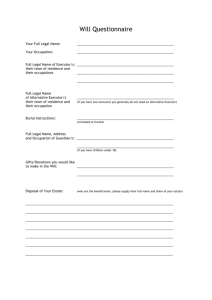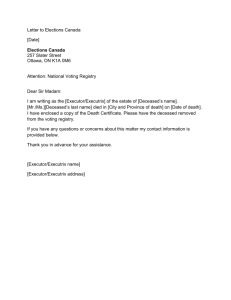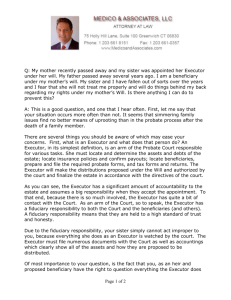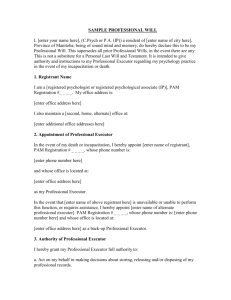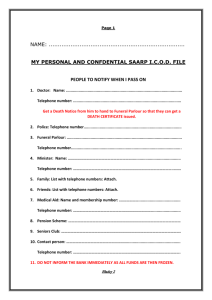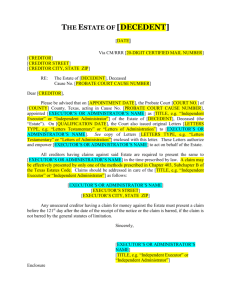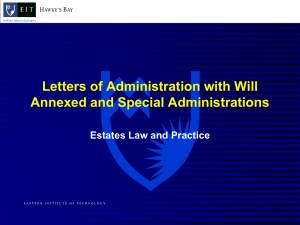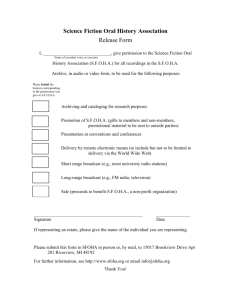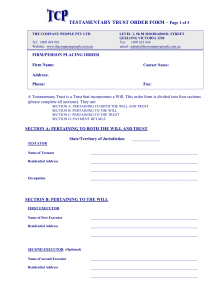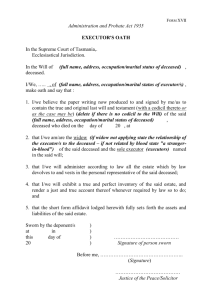GUIDELINES FOR PREPARING YOUR PROFESSIONAL WILL
advertisement
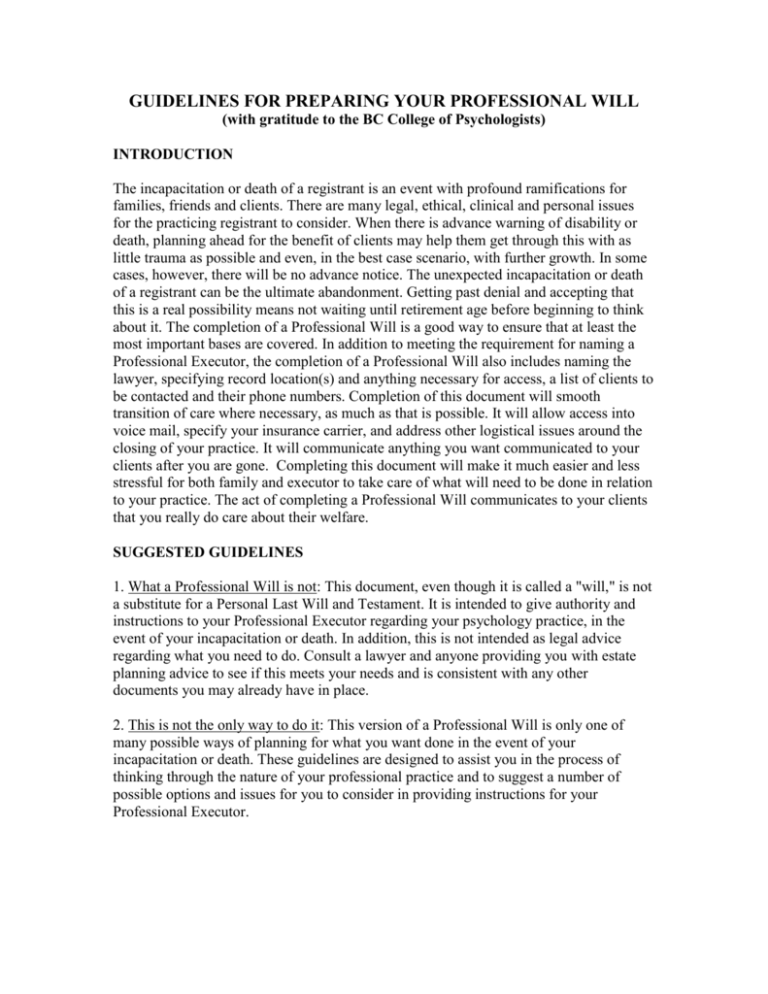
GUIDELINES FOR PREPARING YOUR PROFESSIONAL WILL (with gratitude to the BC College of Psychologists) INTRODUCTION The incapacitation or death of a registrant is an event with profound ramifications for families, friends and clients. There are many legal, ethical, clinical and personal issues for the practicing registrant to consider. When there is advance warning of disability or death, planning ahead for the benefit of clients may help them get through this with as little trauma as possible and even, in the best case scenario, with further growth. In some cases, however, there will be no advance notice. The unexpected incapacitation or death of a registrant can be the ultimate abandonment. Getting past denial and accepting that this is a real possibility means not waiting until retirement age before beginning to think about it. The completion of a Professional Will is a good way to ensure that at least the most important bases are covered. In addition to meeting the requirement for naming a Professional Executor, the completion of a Professional Will also includes naming the lawyer, specifying record location(s) and anything necessary for access, a list of clients to be contacted and their phone numbers. Completion of this document will smooth transition of care where necessary, as much as that is possible. It will allow access into voice mail, specify your insurance carrier, and address other logistical issues around the closing of your practice. It will communicate anything you want communicated to your clients after you are gone. Completing this document will make it much easier and less stressful for both family and executor to take care of what will need to be done in relation to your practice. The act of completing a Professional Will communicates to your clients that you really do care about their welfare. SUGGESTED GUIDELINES 1. What a Professional Will is not: This document, even though it is called a "will," is not a substitute for a Personal Last Will and Testament. It is intended to give authority and instructions to your Professional Executor regarding your psychology practice, in the event of your incapacitation or death. In addition, this is not intended as legal advice regarding what you need to do. Consult a lawyer and anyone providing you with estate planning advice to see if this meets your needs and is consistent with any other documents you may already have in place. 2. This is not the only way to do it: This version of a Professional Will is only one of many possible ways of planning for what you want done in the event of your incapacitation or death. These guidelines are designed to assist you in the process of thinking through the nature of your professional practice and to suggest a number of possible options and issues for you to consider in providing instructions for your Professional Executor. 3. Professional Executor: Your designation of a Professional Executor may be the single most important function of this document. This will facilitate the process of what will need to be done in the event of your incapacitation or untimely death. Your Professional Executor should be a registrant you respect and trust. Meet with this person as part of the process of writing your Professional Will in order to familiarize him/her with your practice and discuss what you would like done. Your Professional Will is most likely to be carried out effectively if your Professional Executor is involved in the planning process. Selecting a Professional Executor involves a dialogue where mutual responsibilities, expectations, questions, etc. can be resolved to the satisfaction of both parties. If the Professional Executor is not familiar with your office, arrange a meeting there and schedule a “walk through” so the Professional Executor can gain some familiarity with your office and the location of its contents”. 4. Backup Professional Executor: If, for any reason, your designated Professional Executor is unavailable or unable to perform this function, it is wise to have at least one backup. This registrant may also be the best person to assist the Professional Executor in the likely event he/she will need assistance. 5. Authority for Professional Executor: In order for your Professional Executor to be able to act on your behalf, you need to give him/her the authority to take appropriate action with your records, and you also want him/her to be able to delegate activities to others so that no single person becomes overwhelmed by the magnitude of the task. 6. Legal Advice: You may want to discuss your needs with a knowledgeable lawyer and use his/her expertise in determining the details of how your professional affairs will be handled. A final copy of your Professional Will should be filed with your lawyer. Specifying who your lawyer is and how to get hold of him/her will expedite your Professional Executor's task. It should be noted however, that a Professional Will can be completed without involving an lawyer. 7. Executor of Personal Will: Having completed a Personal Will is extremely important and valuable in its own right. The presence and availability of a Personal Will also strengthens the effectiveness of a Professional Will. Assuming that you have a Personal Will, the name of its executor and how to contact him/her will allow your Professional Executor to reach this person quickly. There will be a number of things that the two of them will need to discuss and coordinate on your behalf. 8. Client Records: Specify the location(s) of your current and past client records. And if you have not already done so, sort them into these two groups and arrange them alphabetically. Specifying the date first seen and when the case was closed on the outside of the file will also be helpful to your Professional Executor. In addition to the Code requirement, Legibility of the records is a huge plus and ensure that at least the face sheet, with the client's name, phone number and address is easily legible. 9. Test Materials: The Professional Executor should strive to assure that all psychological test materials are maintained in a confidential and secure manner. 2 10. Billing and Financial Records: Specify the location of your billing and financial records. This will allow your Professional Executor to facilitate the completion of any outstanding billing and financial transactions related to your practice in an orderly manner. Your estate will thank you. 11. Appointment Book and Client Phone Numbers: This will be one of the first things your Professional Executor will need. Ready access to this information will allow clients with whom you have appointments scheduled to be contacted personally prior to their arriving at your office and finding you not there. 12. E-Mail Address Password and Voice Mail Access Code: Having this information readily available will allow your voice mail message to be changed to indicate what has happened and/or who to contact and will facilitate response to any voice mail or e-mail messages in a timely fashion. If you prefer, your passwords and access codes can be referenced in this document and kept with the copy of your Professional Will in your professional liability insurance file along with your list of client names. 13. Your Keys: Your Professional Executor should be easily able to locate the keys to the various things he/she will need to access, such as your office, filing cabinets, storage facility, etc. Having them labeled and telling your Professional Executor where they are will obviously facilitate this. 14. Further Assistance in Locating/Accessing Records: List any other people who might be helpful in locating or accessing your client, billing and financial records, your appointment book, phone numbers, etc. (e.g .a spouse or relative, a secretary, a billing person, a friend, an office mate, etc.). 15. Location of Copies of Professional Will: It is suggested that the original be filed with your personal will and copies be given to your lawyer and Professional Executor. In addition, it is recommended, more as a reminder to yourself to check and update it annually, to file a copy with your malpractice insurance. policy. This is a way of ensuring you will at least see it annually and consider whether any changes need to be made and ensure accuracy of the information. 16. Notification of Current and Past Clients: A list of current and selected past clients you wish to have notified about your death and any planned memorial services along with their phone numbers will allow this to be done relatively easily. This will be an efficient way of deciding who to call if you want to have clients at your memorial services or if you want special memorial services for clients only. There are a variety of options regarding memorial services. You can leave this up to the discretion of your Professional Executor or you can specify your wishes. The general notification of your death to your clients can be done in a number of ways. For example, it can be done by phone, in writing, and/or through a notice in the newspaper. This can be left up to the discretion of your Professional Executor or specified by you. Similarly, you can be specific regarding which clients should be offered face-to-face meetings in 3 the short term vs. being given referrals. Also, you can decide to whom you want referrals made. Or you can leave these decisions up to your Professional Executor. It’s up to you. 17. Professional Liability Insurance: Your malpractice carrier should be notified of your death as soon as possible. This will allow arrangements for any additional coverage to be made right away. Major carriers may provide additional coverage if they are notified in writing by your authorized representative within 60 days. This will require proof of your death. 18. Client Records: The Professional Executor will need to make arrangements for copies of your records to be sent to your clients' new therapists and for storing, releasing and disposing of your records as per the Code of Conduct and Practice Advisories. The Professional Executor is responsible to ensure compliance with the Code of Conduct with regard to the confidentiality and security of psychological test materials. 19. Reimbursement of Your Professional Executor: Your Professional Executor will be spending a lot of time implementing your wishes. It is important that the amount allocated and conditions under which it will be paid, be clearly delineated in the registrant’s Personal Will. These matters should be discussed in advance with your Professional Executor and to agree upon a sum in advance to avoid putting him or her in an awkward position later. The actual amount would depend on the size and complexity of your practice and should be commensurate with the scope of the task to be completed. Additionally, whatever financial arrangements are set forth in the Personal Will, all payment to the Professional Executor needs to be finalized in a circumscribed period of time, e.g. one or two months, as a Personal Will cannot pass through probate with outstanding debts. 20. For Further Information: For immediate assistance, consultation with fellow registrants knowledgeable about Professional Wills and the role of the Professional Executor or put your question to the PAM Registrar. 4
